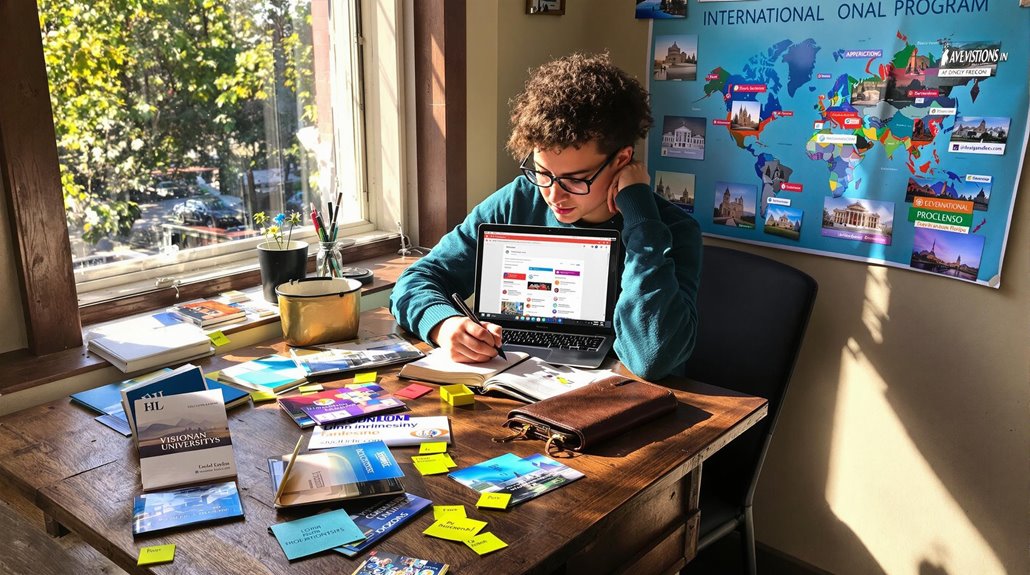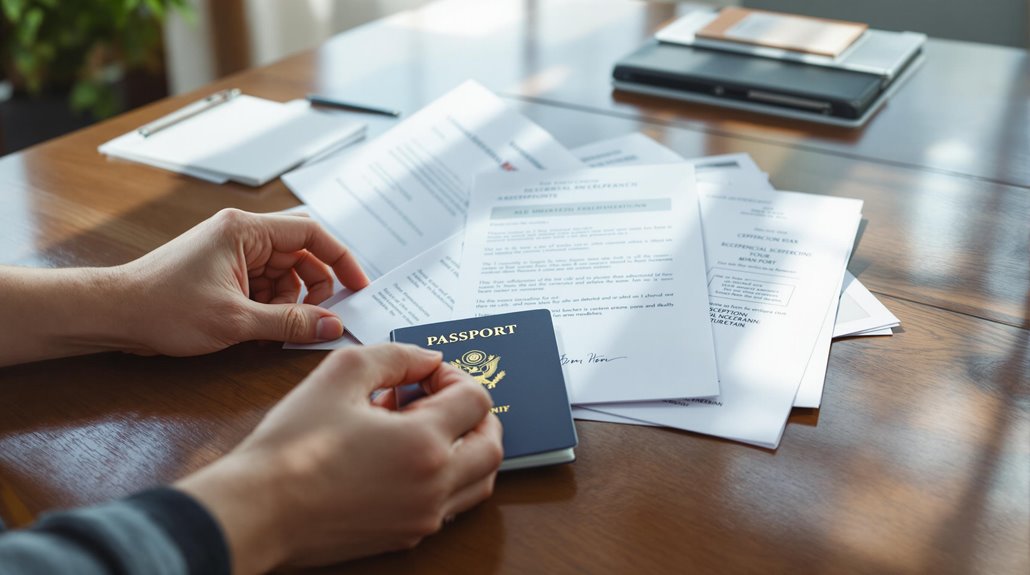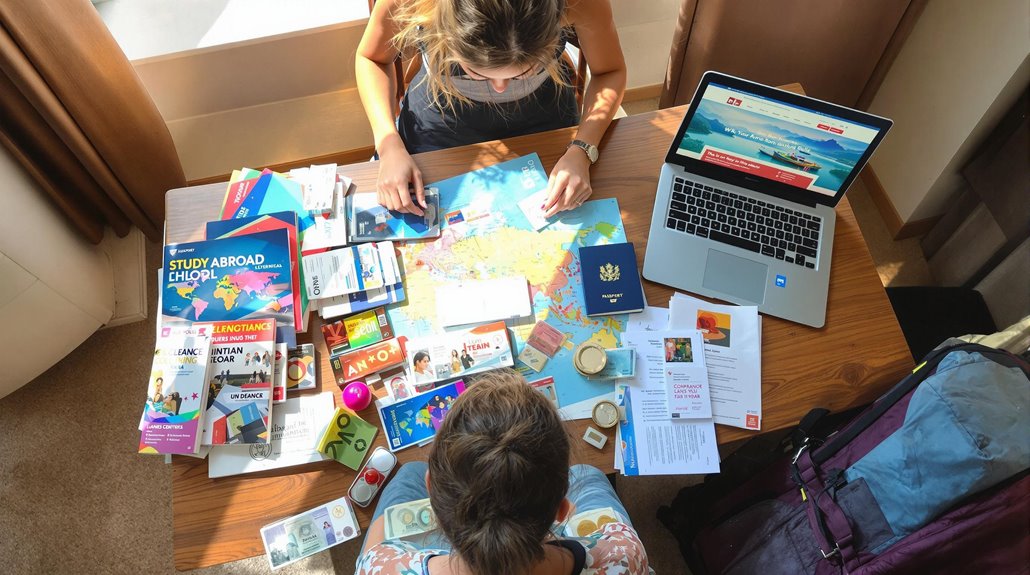To study abroad, you'll need to define your academic goals, research destinations, and check university requirements. Create a realistic budget, explore funding options, and prepare necessary documents like transcripts and visas. Arrange health insurance, plan for cultural adjustments, and set up banking services. Consider language preparation and communication needs. From choosing your dream destination to managing international paperwork, each step brings you closer to your global education adventure.
- Define Your Study Abroad Goals
- Research Destinations and Universities
- Check Academic Requirements and Prerequisites
- Create a Budget and Explore Funding Options
- Prepare Required Documents and Applications
- Secure Housing and Travel Arrangements
- Apply for Student Visas and Permits
- Arrange Health Insurance and Medical Clearance
- Plan Cultural Adjustments and Language Support
- Set Up Banking and Communication Services
- The Last Word
Define Your Study Abroad Goals

When you're considering studying abroad, establishing clear goals is the foundation for a successful international education experience.
Start by identifying what you'd like to achieve academically, personally, and professionally during your time overseas. Maybe you're keen to master Mandarin while studying business in Shanghai, or perhaps you're dreaming of exploring ancient Roman architecture while earning credits toward your art history degree.
Consider how your goals align with different program options, and don't forget to account for potential challenges you'll face. Your experience will help you develop critical thinking skills as you navigate diverse educational environments and teaching methods.
Researching destinations with affordable tuition options can help you align your academic goals with your budget constraints.
Whether it's managing homesickness, traversing cultural differences, or adapting to new academic standards, having clear objectives will help you choose the right program and make the most of your international adventure.
Research Destinations and Universities
As you begin exploring study abroad possibilities, researching potential destinations and universities stands as one of the most exciting and essential steps in your journey.
Europe's big three – Italy, Spain, and the UK – attract over 40% of U.S. students, but don't overlook emerging destinations like Ghana, Morocco, or Switzerland for unique experiences.
Consider program duration that fits your needs, as 60% of students choose programs under eight weeks, while others commit to full semesters.
You'll want to match your field of study with the right destination – STEM students make up 25% of study abroad participants, while language enthusiasts often head to France or Brazil.
Remember to factor in visa processing times, which can take months for countries like Japan.
Selecting a university with a strong culture program can enhance your global perspective while helping you master a new language.
Research available study abroad scholarships early, as many programs have application deadlines months before departure dates.
Check Academic Requirements and Prerequisites

Before starting your study abroad adventure, you'll need to meet specific academic requirements that vary considerably across programs and countries. Most universities require at least a 2.0 GPA, though competitive programs often set higher standards around 3.0.
You'll also need a clean academic record – no probation allowed!
If you're eyeing graduate studies, you'll need a bachelor's degree, and some PhD programs might require a master's first.
Don't forget about age restrictions, especially in countries like China, where they've set strict caps.
Language proficiency is essential too – you'll likely need TOEFL or IELTS scores if you're heading to an English-speaking country.
Transfer students, take note: you must complete one semester at your current university before applying, and watch those residency requirements carefully. Fifteen credits of your final 21 credits must be completed at your home institution.
Create a Budget and Explore Funding Options
Planning your study abroad finances requires careful thought and smart budgeting strategies to make your international dreams a reality.
Start by using tools like Mint and Numbeo to track expenses and research cost-of-living indexes in your destination country. Don't forget to factor in those sneaky hidden costs like visas, flights, and program deposits. Setting aside emergency savings is crucial for unexpected situations that may arise during your semester abroad.
Smart travelers plan ahead – use digital tools to track expenses and uncover hidden costs before your study abroad journey begins.
When it comes to funding, verify if your current scholarships or financial aid will transfer overseas, and explore program-specific opportunities through organizations like CET and Fund for Education Abroad. Remember that exchange rate fluctuations can significantly impact your overall budget during your time abroad.
You'll want to set aside 10-20% of your budget for cultural activities and travel adventures. Consider securing a part-time job or internship abroad, and maximize your student status with an ISIC card for sweet discounts on transportation and attractions.
Prepare Required Documents and Applications

Successful study abroad experiences hinge on meticulous document preparation, which you'll need to start several months before your intended departure.
Start by gathering core materials like your application form, CV, and official transcripts, making sure they're translated if necessary. You'll also need a compelling statement of purpose that showcases your goals and program fit.
Don't forget the vital visa requirements – a valid passport, visa application forms, and those ever-important passport photos (where you'll try your best not to look like a deer in headlights).
Financial documentation and health records are essential too. Your documents should include proof of adequate financial savings plan to cover your study abroad expenses. If your program requires standardized tests like IELTS or GRE, schedule these well in advance.
Remember to track deadlines carefully, as each university might've different submission timelines. Consider reaching out to expert counselors who can provide guidance throughout your application process at no cost.
Secure Housing and Travel Arrangements
Securing comfortable housing and reliable travel arrangements can make or break your study abroad experience. From homestays with local families to shared apartments and dorms, you'll need to weigh your options carefully while keeping your budget in mind. Housing selection operates on a first-come, first-served basis during the application process. Student housing prices in London vary significantly by neighborhood and accommodation type.
To guarantee a smooth changeover to your new home away from home:
- Book housing early, as 87% of successful students secure accommodation before departure.
- Research local neighborhoods for safety, amenities, and commute times.
- Consider homestays for culture and included meals.
- Verify all housing arrangements through official channels to avoid scams.
Don't forget to book refundable flights, secure mandatory insurance, and utilize student discounts through ISIC cards for travel.
Apply for Student Visas and Permits

While many students focus on choosing their dream study abroad destination, obtaining the necessary student visas and permits can be the most challenging part of your journey.
You'll need to start by researching country-specific requirements through embassy websites or VisaHQ, keeping in mind that processing times can stretch from weeks to months. Most countries now require students to show proof of full COVID-19 vaccination before approval. Gather essential documents like academic transcripts, financial proof, and passport scans early, and don't forget that perfectly-sized visa photo!
You'll likely need to submit your application through an online portal, pay various fees (including the SEVIS fee for U.S.-bound students), and possibly attend an in-person interview.
Remember to prepare clear answers about your study plans, financial capacity, and post-program intentions to make the process smoother.
Arrange Health Insurance and Medical Clearance
Health insurance abroad isn't just another box to check – it's your safety net in unfamiliar medical territory.
International health coverage acts as your lifeline when navigating foreign healthcare systems, protecting you far from home.
You'll need thorough coverage that meets both your university's requirements and your host country's mandates, while keeping your domestic insurance active for emergencies back home.
Northwestern students can expect to pay $210 per quarter for their required GeoBlue international health coverage.
Before departure, you'll want to:
- Submit proof of valid international coverage through your school's platform
- Arrange pre-travel medical checkups and secure necessary vaccinations
- Research prescription medication restrictions in your host country
- Understand your policy's reimbursement procedures for out-of-pocket expenses
If your school offers GeoBlue coverage, consider enrolling – it's specifically designed for study abroad needs.
Don't forget to verify coverage for any pre-existing conditions and confirm your policy spans your entire time abroad to avoid costly gaps.
Plan Cultural Adjustments and Language Support

Successfully maneuvering your study abroad experience hinges on mastering both cultural differences and language barriers before you depart. Start by researching your destination's social norms, from greeting customs to classroom expectations, and download language apps like Duolingo to build essential vocabulary.
You'll want to understand local conflict resolution styles, payment customs, and proper etiquette for daily interactions. The first few weeks may feel like a honeymoon phase as you explore your exciting new surroundings.
Don't fall into the common trap of isolating yourself with other international students. Instead, join local clubs, participate actively in classes, and seek out native conversation partners. Many students find that culture programs offer the most effective way to adapt to their host country.
Consider setting up a blog to document your cultural discoveries – it's amazing how many "obvious" customs aren't so obvious when you're adjusting to a new country.
Remember to utilize your university's cultural centers and mentorship programs for additional support.
Set Up Banking and Communication Services
A solid financial foundation makes or breaks your study abroad experience, starting with setting up essential banking and communication services in your host country.
You'll need to gather important documents, like your passport and enrollment proof, to open a local student bank account that'll save you from pesky foreign transaction fees. International money transfers often require multiple authentication systems that can take several business days to process. Voice over IP apps provide free or low-cost international calling options to help you stay connected with loved ones back home.
To guarantee a smooth changeover, follow these vital steps:
- Open a student account with banks like HSBC or Citibank that offer global services
- Get a local SIM card with student-friendly plans for constant connectivity
- Download encrypted messaging apps to stay in touch with family
- Keep an emergency fund of $1,000-$2,000 for unexpected expenses
Don't forget to use partner ATMs and mobile banking apps to track your spending efficiently while abroad.
The Last Word
You're now ready to spread your wings and commence your study abroad journey, like a butterfly emerging from its chrysalis. As you navigate these ten stepping stones across the international waters of education, you'll transform your academic dreams into reality. Pack your compass of curiosity and map of determination – they'll guide you through this life-changing adventure. Remember, every great journey begins with a single, well-planned step.

